We live in a country that was founded on differences. As I write this, I recall images of Felix Baumgartner free falling out of a hot air balloon from space. We value this ingenuity, this creativity, this originality, this risk-taking. We live in the land of the free and yet everywhere you look, particularly in public education, it would seem we have collectively handed over our freedom in the name of compliance, consistency and the oh so not “common”, known as The Common Core.
The powerful noblemen have doled out their marching orders to us, the commoners and we had better comply or beware. David Coleman and Susan Pimenthal, co-authors of the Common Core Standards, are not educators. They have not spent time in classrooms on the front lines and yet they have determined the core, the central, innermost, or most essential part of education. So the question is…what does this mean for the public education of our students, your kids, my kids and those of the future?
The Common Core Standards document initially reads as somewhat benign. Who would argue the idea that there “should” be a core of standards that all students in this great nation strive for? (Although I tend to avoid “shoulding”on myself at all costs) How could one oppose standards, ensuring success for all students? (I mean if over 40 states adopted this then it must be great.) Who would dare even oppose such a notion? (And if you do oppose then what is wrong with you to be such a “curmudgeon” or a “whiner”.) At the risk of being both I will go on.
Read this kindergarten standard keeping in mind many 5 year olds show up to school and they do not even know their letters and they are beginning to lose their baby teeth. For some they have never even attended preschool and this is their first school experience. They are filled with wonder, curiosity, creativity and a natural desire to learn.
CCSS.ELA-Literacy.W.K.1 Use a combination of drawing, dictating, and writing to compose opinion pieces in which they tell a reader the topic or the name of the book they are writing about and state an opinion or preference about the topic or book (e.g., My favorite book is…).
I would argue that this is a more realistic standard for our 1st or 2nd graders. Do we want our students to succeed or do we want to set standards that are so out of their range of normal development that they fail even before they begin?
And while I realize there ARE 5 year olds all over the nation who are more than capable of performing this standard, there are just as many who are not. There is nothing magical about being 5 that means you are as developed as the other 5 year olds sitting next to you, not to mention that our boys are typically at least 6 months behind our girls. And if this standard was something to look at in terms of a goal to work towards, I would have no problem with it, but it will not. It will be seen as what is expected as “common” for all students. We are starting out leaving over half of our kids behind.
There is no such thing as kindergarten anymore with these standards. Sorry kids, no time to learn your letters, learn through play and be 5 years old as the standards expect you to show up to school reading informational texts closely and writing persuasive essays already. Put away the sand tables and the blocks and the dramatic play areas there is work to be done. And this begs the question, why are we so concerned with the academic side of the child without including the social and emotional sides? They all work in connection with each other and without each given it’s due the scales are tipped toward disaster.
The Common Core standards alone are not bad. In fact, in my work with schools there are great conversations that are happening as a result of this document as it asks us to look at where we are and what we are doing and what areas we need to improve on. This is all good reflective practice and if it started and ended there…we would be able to say to ourselves, “This too shall pass”. But will it? Never before in public education has there been such a broad sweeping, nationally accepted document. And while states all over the nation are adopting this document, two groups are being paid millions of dollars to come up with the best assessments (See PARCC (http://www.parcconline.org/achieving-common-core) and Smarter Balanced at (http://www.smarterbalanced.org/)).
And therein lies the rub. The high stakes testing piece to this latest “one size fits all” movement will come out in the year 2014 and I am predicting that at this point everything will change. Schools all over the nation will be failing these tests and large publishing companies will be at their doors with the next magic bullet that will “solve” all testing deficiencies. Have we learned nothing from No Child Left Behind? The idea of “teaching to the test” will take on more power and energy than ever.
This is not about good education. This is not about educating our kids. This is about making money and in order for that to happen we must first create an enormous problem. Failure is the best reason for anyone to buy anything! Overweight? Buy this pill or that diet. Failing schools? Don’t leave it up the professionals within the schools to figure out what they need, because publishers know so much more. Students? Who are they?
We need to return to conversations about our students and what is or is not developmentally appropriate, what our students need for instruction in the moment based on their thinking, their questions and how they see the world. Would you ever take an infant and force them to “walk” down the stairs? NO! But physical development is something concrete. Cognitive development, on the other hand, is harder to understand and yet we forge ahead with the idea that if we place unrealistic expectations on our students then they will just rise.
They will not rise unless they are ready to rise!! Those who are not ready will fall and hurdle to the bottom of the stairs with nobody with be there to pick them up as there is a test to teach to and quite frankly, “I don’t give a sh!t what you think or feel.” This is a quote from David Coleman, one of 2 co-authors of the Common Core. He has also taken on the position as head of The College Board 2 months ago. This organization has more power over the future of all of our students and now this man will also align the SAT’s and test preps with ‘HIS” common core. There is even talk of test scores being attached to kids GPA’s. Can you say conflict of interest?
Why and how, I must ask, have we allowed one elitist man from Harvard to have so much power over our entire system? A man, who only cares about what he thinks. Watch him as he demonstrates his version of a close reading on YouTube (http://www.youtube.com/watch?v=aTCiQVCpdQc) with A Letter From Birmingham Jail. Or don’t, unless you really need a nap! THIS is the future model for good teaching? He is completely in his own head and unaware of his audience. This demonstration both scares and depresses me.
And yet, why is it that those of us in education are the first ones to jump on to any wagon that happens to be going by, regardless of what band is playing? Where has our responsibility to question gone? Why are we not asking about what band is playing? Why are we blindly following the pack? Let’s question what is happening here before it is too late. Let’s take a risk, jump out of that balloon and take the plunge toward thinking and questioning what this means for our kids, our teachers and the future of our entire public educational system.
PS In my next post I will discuss some ways we can become actively involved as I discuss opting out of testing and events we can attend to show our support.

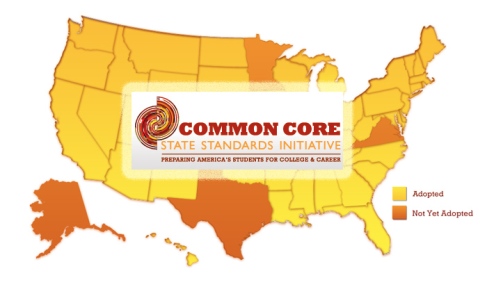
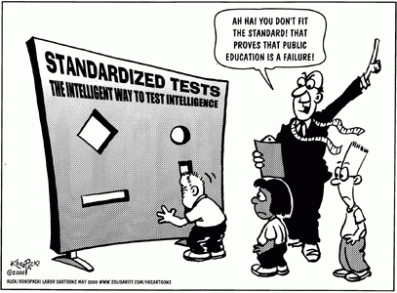

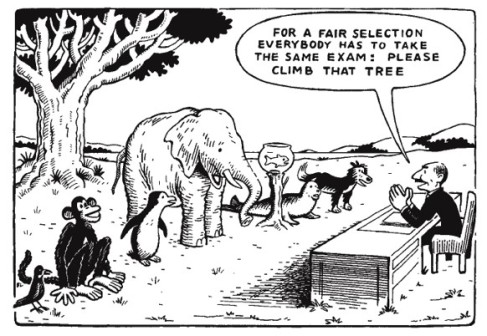

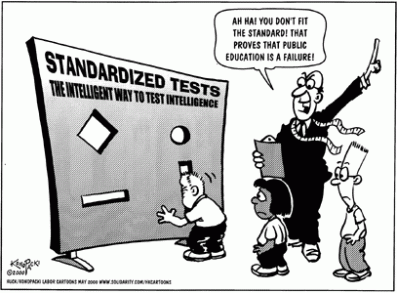
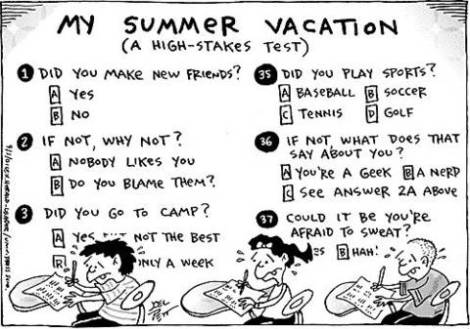
Common Core is an issue, but part of it because the people in power do not know where to go with education. The hope is it will be better than “No Child Left Behind”, but I hope it is only a bridge to something better for our students. The 1950’s model of teaching is no longer serving our students and has not been for years. You hit the nail on the head when you said that “Non-educators” wrote the standards. Where are the educators – yes, they are on the front lines doing the dirty work without little time for their own lives, families, and kids. Without time the big changes being made are not going to happen quickly or the ways we all think and know would most benefit our students. When are we going to, as a nation, talk about family and how education begins at home. Even if the family works constantly than that education can be as simple as being a role model – a good role model for your kids. There is hope out there. I teach in NH and we have applied and been accepted to pilot a portfolio assessment alternative to the standardized tests that will come with the Common Core. It is a baby step I know, but that is a more fair assessment for all kids. We need to give education a voice – from the people who work in education and that is what you are doing! Thank you :o)
Beth,
I would love to know more about the portfolio assessment alternative you will be piloting. Are you following a particular model or creating your own? Bravo and keep on keeping on!
Thanks for reading and responding!
Tomasen
Hi Tomasen,
I am not piloting the portfolio assessment, schools in NH will be, hopefully. I work (as the minute taker) with a few school boards who have been discussing this pilot lately. I am a secondary teacher who is taking time off to be a stay at home mom, but I keep my finger on the pulse of education through my job as a minute taker and actually I have learned a ton by doing this! When I learn more about what the portfolio assessment may look like I can let you know.
Beth
Brava, Tomasen! I hope I’m not wrong, but I get the feeling that there are more voices out there asking the kind of questions we so desperately need to be asking—or perhaps blogging has just helped me find the voices that I so need to hear. I passed this on to Renee Dinnerstein, my friend and colleague who arranged for the study group to Reggio Emilia that I was part of this October, and I think you’d like her blog as well, especially the post on The Safest Place, which explores some of the same ideas and concerns you do here: http://investigatingchoicetime.com/.
Pingback: A Wise Voice in Education! | Investigating Choice Time: Inquiry, Exploration, and Play
Vicki,
I so hope you are right!! It is such a small world. Renee and I have been connected for some time now through Matt Glover!!
Well argued, race to the top was an end around taking a close look at NCLB and making real, substantial changes that will move the profession forward rather than commoditize it.
Jeff,
Thanks for reading. Just back from your blog. Many interesting posts! Thanks for reading!
Tomasen
I am clapping here in Western New York, Tomasen. Thank you for these wise words. I am sharing this post and look forward to your next.
Thank you! LOVE the applause and can hear it here in NH! SO thrilled to “see” you here!! Thanks for sharing…the more readers I can muster up the better!
Tomasen
I have had many of these same concerns. Children need to be allowed to develop, not left to simply “flower” a la Rousseau, but be nurtured and supported to rise in their way a la Vygotsky….. with encouragement and appropriately challenging activities/learning/investigating. Watch a young child “interact with” and learn from his/her environment. Human potential is HUGE. What we really need to be focused on is WHAT ways can we get all teachers and classrooms to provide environments that allow children to grow in ways that will get them to the end as functioning, whole, happy, engaged, thoughtful and skilled people; humans who along the way care, work, collaborate, seek and learn because they are interested and understand how becoming skilled is vital to their personal fulfillment and success. The CCSS are not “all bad” and certainly they are not tried and true. But the testing, oh the testing. I have heard stories about little kindergarteners as well as older children in tears on their pre-testing/end of year testing. And who exactly are the publishers employing to create the lessons and materials that are going to provide teachers and students with “fail safe” materials that will reach the standards? Many many questions. Many many concerns. And what about class size and money for needed materials and new books and other digital resources?
But first, let’s have some of our leaders with these ideas go into the early grades and take a year to show us (or try to show us) how it will work. Now that could be very telling…..luckily I have faith in teachers. As William Glasser has said, teaching is the hardest profession there is. Harder than being a neurosurgeon. Her patients cooperate; actually they are anesthetized! I hope a teacher will always put her children’s developmental needs first and their own creative problem-solving to the test to find ways to help children grow in the era of the new CCSS classrooms. Perhaps one good thing will be the dialogue among successful practitioners who will create “learning academies” of some sort to in order to share with other teachers who could then adapt/adopt the techniques, if they knew what they were……but this takes time. Teaching is hard work. Important work. Vital work. To assume it can be easily mandated that by imposing higher standards we will get all children to meet them is a fallacy. And really we should not harm children in our efforts to improve education.
Any new program ought to be able to be field-tested. Tying teachers’ evaluations to the new tests (APPR) without adequate preparation is going to prove a real problem I fear and hope I am wrong……
I am new to your site and want to read more. Thank you.
Janet,
Bring it on Vygotsky, Rosenblatt and Rousseau! And while teaching is a challenging profession I believe right now it is harder than it has ever been because we are ignoring the expertise and knowledge of so many while others are not interested in anything other that test scores. The question I always wonder about is “if” we are going to evaluate teachers fairly, why are we alway ignoring the most important group, our students? They are the ones that are the “true” consumers as they are with the teachers every day. In a college setting where I teach there are always student evaluations and I take them very seriously and adjust my teaching according to those evaluations. We all know “those” teachers who shall not be named, but who should no longer be in the classroom, but they remain anyway…and everyone in each school will all name the same people. It is no great secret!
There are so many things to “fix” and yet all of the reform that might suggest “fixing” is simply a call for being college and career ready cloaked in a corporate greed.
I look forward to hearing more from you!
Tomasen
Briefly for now…..I have heard of administrators trying to restrict (outlaw) lattice which after 30 odd years teaching gr. 5 we found in our new gr. 3 math program. I say keep lattice as one option!! It allows 3rd graders who have just learned facts to do 3 digit by 3 digit problems. If done properly ie show them what it means I found it very helpful and they can learn traditional later on, if needed. I say we have to get administrators to honor teachers and judge output not control input. Pam Allyn says we need to invest in the transformational conversation and opportunity of these times.
Pingback: The Not So Common Core Standards: Potential Implications and Meaning For Us All « inspired educationalists